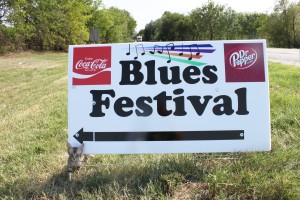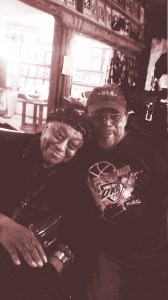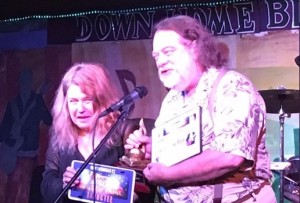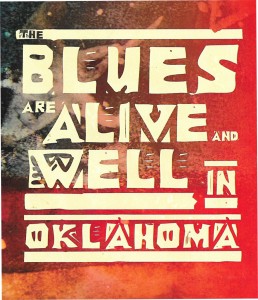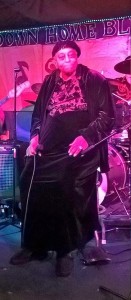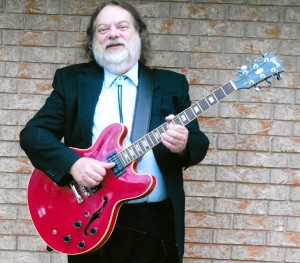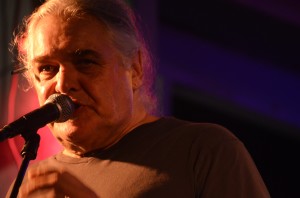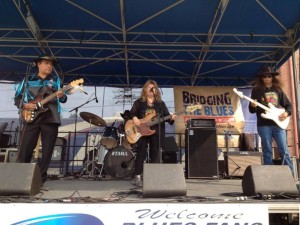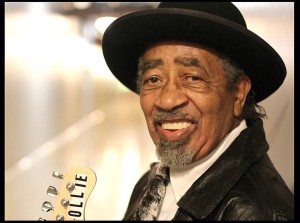Friends of Rentiesville Blues and Selby Minner are proud to announce a full line-up of local, regional and national acts for the 27th annual Rentiesville Dusk til Dawn Blues Festival, slated for Labor Day weekend. The festival will be held at the old Minner family-farm-turned-venue, the Oklahoma Blues Hall of Fame on Sept 1 – 3
DUSK TIL DAWN BLUES FESTIVAL IN OKLAHOMA
the best music ever by bands you may not even know!
“If you really want to get off the beaten path, check out this all-night blues festival in tiny Rentiesville, one of Oklahoma’s few surviving historically all-black towns. Night owls dig the blues from 5 p.m. to 5 a.m. for three days straight. ” Denver Nicks; National Geographic
Oklahoma Blues Hall of Famers will grace the stage in abundance this year in Rentiesville. At least 10
PARTIAL B R E A K D O W N . . .
B a n d B i o s
HEADLINERS INCLUDE:
JOHNNY RAWLS keeping the Mississippi Blues alive and on the road non stop for years. He was voted Soul Blues Artist of the year by the Memphis based International Blues Foundation…charms the ladies, and the men love him too! Red Cadillac is his hit …also I Say Yes, Yes, Yes, Yes, Yes! You have seen Johnny here before… and this year hw will be back, Friday night only
AKEEM KEMP from Arkansas – placed in the IBC Youth Challenge in Memphis
Harry Williams OBHOF
Harry will play drums behind several artists over the weekend and provides drum sets on all three stages and does airport shuttle as required. From Tulsa he was Flash Terry’s drummer for years until his death and runs the Sunday jam session a the Cimmarron Bar in Tulsa – 10 years.
Lem Sheppard OBHOF
He has performed across the United States, South America, Africa, and at the Kennedy Center. Lem composed and performed the soundtrack to the PBS documentary Black, White and Brown, is a member of the Oklahoma Blues Hall of Fame and a recipient of the Kansas Folklore Societys Joan OBryan award. Sheppard has performed with Taj Mahal, Jimmie Lee Robinson, Little Charlie and The Night
Roger Hurricane Wilson OBHOF
This year, Roger is celebrating his 41st year as a professional musician. . He has toured over a million miles, shared the stage B.B. King, Buddy Guy, Dickey Betts, Hubert Sumlin, and John Mayall, just to name a few. In addition to having 14 CD’s on the market, for the last 10 years, Roger done extensive work doing Blues in the Schools
SELBY MINNER http://www.youtube.com/watch?v=azata5jRcB0&feature=youtu.be<iframeplus
BONNIE McCOY http://archive.org/details/scm-249642-bonniemccoy the niece of Memphis Minnie, Bonnie McCoy. Her heritage includes her father George McCoy and his sister Ethel McCoy (who sang with Chuck Berry in the 50′s). George’s brother, Kansas Joe McCoy, recorded and performed with Minnie in her hottest years. Bonnie raised her family and now has time to peruse her dream to be a blues singer in the family tradition. Last year, Seattle based Arcola Records released her debut recording “Child of the Blues” with liner notes by Dr. David Evans (Professor of music Memphis University). The CD was produced and released by Bob West, the host of “King Biscuit Time” on the now defunct radio station KRAB-FM 107.7. “Child of the Blues” features Eric Freeman along with Northwest artists Ashley Durant, Anthony Estrada and Mike Daugherty.
LEON ROLLERSON OBHOF
A complete concert, entertainment, musicial, television, radio, and video production company. One of Oklahoma’s largest entertainment, production, broadcasting, combination company. For more information please visit our website or call us at 918-402-7721. You can also email us at lrp@rollersonproductions.com
Leon Rollerson, a Legend from Tulsa: Leon is a bassist and vocalist and a very busy man. he runs “A complete concert, entertainment, musicial, television, radio, and video production company. One of Oklahoma’s largest entertainment, production, broadcasting, combination company. For more information please visit our website or call us at 918-402-7721. You can also email us at lrp@rollersonproductions.com”
Deb Bynum She comes in from Stillwell and also covers the event as a photographer.
Shiron and Oscar Ray Barebones Movie Productions
this is really a labor of love as they come and stay the entire festival and document the performers on the main stage each year – 7 bands per night for three nights for about the last 10 years. they also project the performance on the large screen down by the stage.
Local and great. a very versatile guitarist/singer/entertainer from jazz to western to funk to Spanish to blues guitar. Harley lives in Muskogee and will do a fun and entertaining set.
Harold Aldridge Jr. OBHOF
a retired professor from NSU born and raised in the all black township of Taft harold brings a rockin good time with his singing and acoulsitc guitar – and don’t forget the stomp box which takes the place of a drummer. Recently played at the OKC History Center to standing room only. Harols plays the back porch stage.
Eric Walker
a talented guitarist and keyboard player and singer from Tulsa, pre world war II blues is the gentleman’s specialty.
Wonda Macon
Service Description: A life in the music, Wonda came up in a family of musicians in OKC. She is a dancer and entertainer as well as a singer…fun times!
Dylan Whitney
Lean and young, Dylan works his guitar over and people love him. From the Tulsa area he loves the music…it shows.
OKLA OLLIE
CeCe,
Roger Hurricane Wilson (GA), toured over a million miles
Jerome Robinson, bassist in from Florida
Sunsetter and the Jazzy Blues Men Band with Ms Sunset and the one and only ‘Spank Me Baby’ in OKC – indoor club stage
GOSPEL Sunday at 6 pm Main Stage – free for seniors – Rev Tony Wise’s VOPBC Men’s Choir
HAROLD ALDRIDGE Dr. Harold Aldridge March 3, 2014 Aldridge sings the blues Dr. Harold Aldridge is a retired professor of psychology at NSU in Tahlequah. Tahlequah Daily Press By RENEE FITE Special Writer TAHLEQUAH — The gray is beginning to cover his once-black hair, and it shows when the tall, lanky musician adjusts his black felt cowboy hat. He’s admits to being a little nervous. To keep his hands busy and mind occupied before the show begins, he tunes his guitar, glancing around the room, waving or nodding to friends. “An Evening of Blues Music,” presented at Webb Tower by Dr. Harold Aldridge, professor emeritus of psychology at Northeastern State University, was in observance of Black History month. After a brief introduction and enthusiastic applause, Aldridge began with a joke. “As the milk cow said to the dairy man, ‘Thanks for the warm hand,’” he said. For the next hour, the audience was taken on a journey through black history via the blues, from deep in the Mississippi Delta, to Alabama, the East Coast, Kansas City, Oklahoma, Texas and California. “I’m going to tell you the history of blues, and hopefully, it will be entertaining,” Aldridge said. “I stick with the old stuff, from Memphis, Mississippi, Alabama, and Tennessee.” According to Aldridge, blues music is evolving. “It’s almost like rock in some places; I guess next we’ll have rap blues,” he said. As his story unfolded, the audience learned the blues has changed with varying locations and situations. “The blues originated in West Africa and came here as a feeling, the soul of it, the spirit of high John the Conqueror,” said the Aldridge. “Guitars and banjos came, too.” Aldridge said his dad sang the old blues songs, and his granddad told stories, as did his aunties, of their history and growing up in the black community of Taft. He also learned all styles of blues as he played guitar with friends of his father, some of the old men around town. “When the slaves worked in the fields doing the same thing every day, they sang out field hollers and chants that built on one another,” said Aldridge. “Along with work songs, spirituals and gospel, they developed into the blues.” Through the songs, they would built one another up, he said. His grandfather worked for Midland Valley Railroad in Muskogee from 1920 to 1945. “He was a gandy dancer, part of a crew of six men who built the railroad track with a pick and an ax,” Aldridge said. “They unloaded gravel by hand, then carried heavy rails and had to line them up. They used the cadence of songs to line it up right.” Throughout the performance, Aldridge mentioned several blues men, his favorites, then played a song typical of that singer’s style, telling stories about him. “Robert Johnson’s deep Delta blues opened up the door for other blues musicians. The deep blues of the South reflects life and death, hard work and hard times,” he said. “As blues left Mississippi and Alabama and filtered, it was changed by the music already there. On the east coast, it became Piedmont blues, a softer sound with more picking to it. In the Chicago-style blues of Jimmy Reed, it was a rolling style: simple, basic stuff. The audience knew his songs and sang along.” Aldridge related the story of R.A.L. Burnside, who spent time in prison for murder. “He denied killing anyone, saying, ‘I did mean to shoot the guy in the head, but his dying was between him and God,’” said Aldridge. “These guys were a different breed of cats.” In Texas, they played a single note, picking blues-style. When blues made it to the West Coast, it had more of a jazz style – like T-Bone Walker, from whom Chuck Berry got his moves. “Oklahoma was a crossroads from Kansas City, to Texas and California,” he said. “How did blues get to Oklahoma? There were blacks who came in shackles with the Five Civilized Tribes, and after the Civil War, tribes were in flux. And there were Freedmen.” The tribes tried to make the territory an Indian state. “But ‘the Man’ saw too many resources for that to happen, he said. “State negroes, born in the U.S., came to Oklahoma territory because it was supposed to be a free state. They were just gamblers enough to believe it would be an open free state.” With the Dawes Commission, many freedmen got land, the same as Indians. “Former slaves and Indians knew nothing about owning little parcels of land; they believed all the land was open and so the land got away from them real quick,” said Aldridge. More family stories followed, including a song written for his grandfather, Buddy Wells, who was a quadroon: a quarter black and three-quarters white. Wells was raised under the tutelage of his white father. His aunties said when the father died, the whites considered Buddy to be “uppity” when he wouldn’t stay in his place, so he left ahead of a mob and set up a home in Taft. Blues songs are born from coping with such situations. “I’m going to sing a song about race, money, politics and sex,” Aldridge said, “So if you don’t like one part of the song, hold on to it and I’ll get to something you’ll like.” Inviting the standing-room-only audience to sing the chorus, he sang, “I had the blues so bad one time; it put my face in a permanent frown; now, I’m feelin’ so much better; I could cakewalk into town.” And like many a blues song, the evening ended with hope and humor. Ben Kracht, chair of the Cherokee and Indigenous Studies, and the NSU History Department, sponsored the event. “I’ve always been a fan of blues music,” Kracht said. “Harold knows the history of the songs and the stories that go with it.” Carl Farinelli, musician and professor, said he shows a video of Aldridge to his American Song as Literature class. “He knows, and takes you back to the roots of the blues from work hollers – rhythms built on work that the poorest folk did in those days,” Farinelli said. “He takes you down a historical blues road. Very few people know that road the way Harold does.” Mike McKinney Son of the great Oklahoma City pianist /educator we inducted last year, June McKinney, and “Road bassist for the Jacksons (recommended by Nate Watts). Credited on the Jacksons album Triumph [Epic, 1980], and is the bassist heard on Jacksons: Live [Epic, 1981].” Mike was playing a five string bass when it was still a novelty and has been around the world on tour twice with Michael Jackson.
Jimmy Preacher Ellis – Despite picking up and moving a lot over his career (Seattle, LA, Honolulu, New Orleans, Tulsa, and Dallas have all at one time been been home), Jimmy “Preacher” Ellis is “an Arkansas soul brother” by birth, and an OBHOF inductee.
. . in from Los Angeles with his band soulful West Coast Blues w Oklahoma roots.
Selby Minner Blues On The Move OBHOF Performer / Educator
The talented singer/bassist/guitarist Selby Minner comes to rock the house. Inducted into the Oklahoma Blues Hall of fame, recipients of the prestigious Keeping the Blues Alive Award (in Education)and founders of the Rentiesville Dusk till Dawn Blues Festival, Selby and her late husband D.C. have been the hub of the Rentiesville Blues scene for over 20 years! She now fronts Blues on the Move. Chosen Blueswoman by Legacy Keepers R Us and the the Barebones Film Festival. She has been featured in Living Blues Magazine, on Black Entertainment Television, the Oprah Winfrey Show, OETA and NPR. She has performed with Albert Collins, Lowell Fulsom, Drink Small, Little Johnny Taylor, Hubert Sumlin, Tony Mathews, and opened for Koko Taylor, Albert King, Bobby Bland and Buddy Guy among others. Selby has been inducted into the Oklahoma Blues Hall of Fame housed in Rentiesville and the Oklahoma Black Museum and Performing Arts Center through the Larry Johnson Foundation. Selby is a seasoned and fun blues singer/bassist who is working with guitar slinger Dan Ortiz on lead. She toured non-stop for 12 years with blues legend D.C. Minner across the US and over to Belgium and Holland before settling at his birthplace of Rentiesville, Oklahoma. There they established the Down Home Blues Club and founded the Dusk til Dawn Blues Festival around 1990, both which continue on to this day. The Festival has gained national attention, and presents more than 200 blues musicians for three days every labor Day Weekend.
- JOANN McMILLAN
- Joann McMillian was inspired to begin her 20 year-career as a professional puppeteer as a little girl in her own backyard that she transformed into a marionette theater. A graduate of the University of Delaware, her residencies may involve students in
puppet or mask construction, creation and development of characters, story and script writing, puppet show production as well as theater games/movement and acting skits. Each residency is geared to the students’ developmental level and is open enough to include a wide range of possibilities based on the sites’ curriculum needs.
gone but never forgotten –
Dorothy Ellis was inducted into the Oklahoma Blues Hall of Fame in 2004. In 2006, she conducted a symposium/dance at the Gerontological Society of America. DVD housed at Columbia University Archives. She has been featured on “Is This a Great State or What?” on Channel 4 in Oklahoma City with Galen Culver. Ellis has also been featured in magazines including Elmore, King Biscuit, Southwest Blues and Edmond Life and Leisure. She has performed with Richard “Groove” Holmes, Little Joe Blue, Drink Small and opened for Bo Diddley and BB King. She has appeared at festivals including Arcadia, Pinedale, Southwest Blues Heritage Fest, Dusk til Dawn and more. The Oklahoma Gazette called her the “The First Lady of Blues.” Blues Travelogue said Miss Blues Band “was drenched in authenticity and performed with a passion that I haven’t seen in years!”
Miss Blues Band performs traditional Blues centered around Southeastern, Southwestern and Delta.
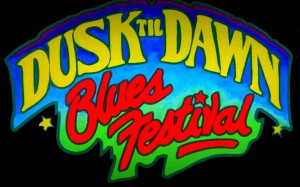
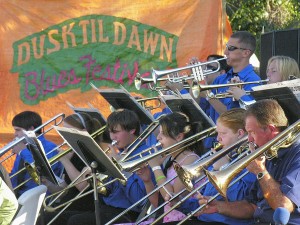
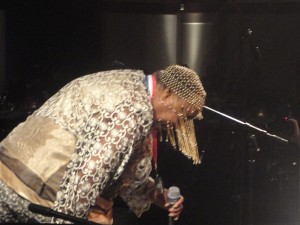 Miss Blues gets inducted into OJHOF, several years after OBHOF induction
Miss Blues gets inducted into OJHOF, several years after OBHOF induction

